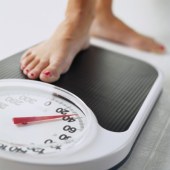tony w
By Shereen Jegtvig NEW YORK (Reuters Health) – In a new study suggesting laziness could be tapped as a tool for healthier eating, people reached for low-calorie apple slices more often than buttery popcorn when the apples were within easier reach. “There are the little things that we can do to just make our diets healthier, and one of them is the simple idea to just put the healthy foods closer to you and you’ll find you can use your laziness to your advantage,” Gregory Privitera told Reuters Health. Privitera, a psychology researcher at Saint Bonaventure University in Bonaventure, New York, led the study, which he says was inspired by experience with his kids. “Every time my kids would tell me, ‘I want a snack,’ I would point to the bowl of fruit on the kitchen table and just say, ‘go at it – you can have as many as you want.,’ and they’d say, ‘oh I don’t want that,’ and I’d say, ‘okay then, make your own snack,” Privitera recalled.
Constant hunger pangs aren’t the only tip-off that your weight-loss plan has crossed over into potentially dangerous territory. If you’ve recently started a diet, check out these signs that you could be harming your health or setting yourself up for a weight-loss fail.
Title: Genes May Influence Weight Gain From Fried Foods: Study
Category: Health News
Created: 3/19/2014 9:35:00 AM
Last Editorial Review: 3/19/2014 12:00:00 AM
By Shereen Jegtvig NEW YORK (Reuters Health) – Programs designed to prevent obesity in children may help lower kids’ blood pressure, according to a new review of past studies. Researchers found that programs targeting both diet and physical activity were more effective than programs that focused on one or the other. Although it’s generally thought of as a disease of middle-aged and elderly people, children can also develop high blood pressure, or hypertension. The American Heart Association recommends that children have yearly blood pressure checks, saying that detecting high blood pressure early will improve a child’s health.
By Shereen Jegtvig NEW YORK (Reuters Health) – Social media that emphasizes sharing and commenting on photos and other images may feed the anxieties of young women with eating disorders, according to U.S. researchers. In experiments with a group of female college students, those who logged into their Facebook accounts were more likely to worry about their weight and body shape afterward, compared to women who read online articles about a neutral topic. For those working on treatment and prevention of eating disorders, the effects of spending time on Facebook may be a factor to take into account, the study team suggests. “We’ve done research on peer influences in other contexts – this is the first time we’ve looked at social media use,” Pamela Keel told Reuters Health.
A new evolutionary theory in BioEssays claims that consuming a diet very low in nutrients can extend lifespan in laboratory animals, a finding which could hold clues to promoting healthier ageing in humans.Scientists have known for decades that severely restricted food intake reduces the incidence of diseases of old age, such as cancer, and increases lifespan.
By Andrew M. Seaman NEW YORK (Reuters Health) – Spending too much time in front of a television, computer or other devices with screens may signal problems in a child’s family and personal wellbeing, according to a new study. Based on data for more than 3600 children in eight European countries, researchers found that family functioning and emotional wellbeing were especially linked to changes in the amount of time kids spent in front of screens. “We really need to do a little bit more digging in this area before we can answer some of the basic questions,” Trina Hinkley told Reuters Health. Specifically, screen time has been linked to differences among children in weight and sleep quality (see Reuters Health stories of March 17, 2014 here: http://reut.rs/1ifw3F2 and March 12, 2014 here: http://reut.rs/1ifw5wz.) Late last year, the American Academy of Pediatrics (AAP) also urged parents to keep tabs on their children’s media use and limit screen time to no more than one to two hours of high quality programming (see Reuters Health story of October 28, 2014 here: http://reut.rs/1f0lfYE.) For the new study, researchers from the Identification and Prevention of Dietary- and Lifestyle-Induced Health Effects in Children and Infants Consortium analyzed data on kids who were between two and six years of age when they entered the study between September 2007 and June 2008.
Researchers found specific practices thought to promote childhood obesity – from putting infants to bed with bottles to feeding them while watching television – were more common in certain racial and ethnic groups compared to others. “Rather than focus on the ethnic and racial differences, these results show us that we can all do better and begin our efforts to prevent obesity earlier in life,” lead author Dr. Eliana Perrin told Reuters Health. More than one quarter of U.S. children aged two to five years old are overweight or obese, according to Perrin and her coauthors, whose results are published in Pediatrics. The researchers asked parents about a variety of behaviors that have been linked to childhood obesity in previous research.
A new study, published in the journal in PLOS ONE, shows which plant food supplements are most popular across Europe, with consumers using them to complement their diets or to maintain health.
Because of his arthritis, Abdul Moussadda couldn’t be physically active and gained weight. Fed up with being immobile and in constant pain, he approached Dr. Steve Naide, an orthopedic surgeon and had two hip replacements. Today, he is back to biking and yoga.

